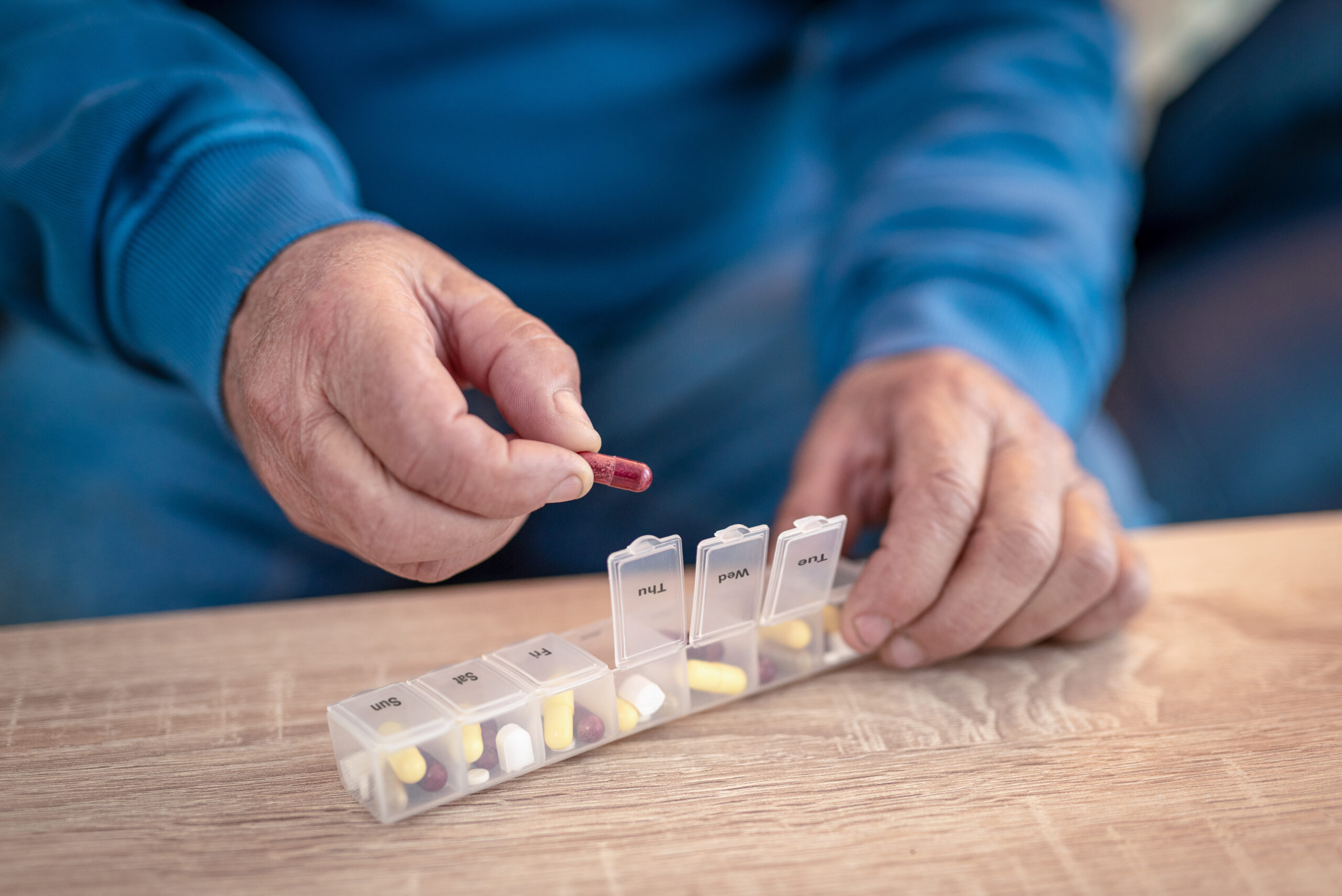Understanding Medication Management: What’s Included and Why It Matters in Long-Term Care
Medication management plays a critical role in ensuring safety, compliance, and quality of life for individuals living in long-term care settings. For facilities that support residents, particularly those with intellectual and developmental disabilities (I/DD), effective medication management is essential for reducing errors, improving treatment outcomes, and keeping operations compliant with regulatory requirements.
But what does medication management really include? While many think of it as simply organizing pills, it is a much broader and more complex process that involves planning, oversight, and coordination between care teams, pharmacists, and prescribers. In this article, we’ll explore the key components of medication management, why it matters in long-term care, and how Park Shore Pharmacon provides tailored solutions for group homes, intermediate care facilities, and other care environments.
Understanding Medication Management in Long-Term Care
Medication management in long-term care refers to the systematic process of ensuring that all medications prescribed to residents are handled safely and effectively. This involves everything from proper storage and dispensing to administration, monitoring, and documentation. For facilities, the stakes are high, errors in dosage, timing, or record-keeping can lead to adverse health outcomes and compliance violations.
In addition, regulatory standards in Florida require facilities to maintain accurate medication records and implement systems that reduce the risk of medication errors. Effective medication management in long-term care helps facilities:
Improve resident safety by preventing dosing mistakes
Maintain compliance with state and federal guidelines
Streamline medication administration for caregivers
Support quality of care and resident satisfaction
Core Components of Medication Management
Behind every safe and organized long-term care environment is a structured approach to medications. It’s more than dispensing pills, it’s about creating systems that protect residents, ensure compliance, and support positive health outcomes. Let’s explore the key elements that make medication management a cornerstone of quality care.
1. Accurate Medication Lists
An accurate medication list is the foundation of safe medication management in long-term care. It should include all prescriptions, over-the-counter drugs, and supplements a resident takes. This list helps prevent harmful drug interactions and ensures every caregiver and healthcare provider is on the same page. Keeping it updated also supports smooth communication between the care team, pharmacists, and prescribers. In medication management for group homes and I/DD facilities, an organized list is essential for compliance and resident safety.
2. Correct Dosage and Timing
Giving medications at the right dose and time is critical for effective treatment. Even minor mistakes in dosage or schedule can lead to complications, such as reduced drug effectiveness or adverse reactions. Caregivers in long-term care settings must follow prescribed instructions precisely. Using tools like color-coded medication packaging and cycle-fill medication systems can simplify this process and minimize errors. These strategies improve medication compliance in LTC environments and make the med pass process safer and more efficient.
3. Monitoring and Documentation
Monitoring how residents respond to medications ensures they receive the best possible care. Caregivers should track side effects, effectiveness, and any changes in health condition. Documenting this information accurately supports compliance during audits and helps the care team make informed decisions. In medication management for long-term care, digital tools like eMAR and EHR integration streamline documentation, making it easier to maintain accurate records. Regular monitoring and proper documentation protect residents and reduce the risk of medication errors.
4. Communication Among Care Teams
Clear communication among pharmacists, prescribers, and caregivers is essential for safe medication management in long-term care. When teams share updates about new prescriptions, dosage changes, or concerns, they reduce the risk of mistakes and improve resident safety. Regular check-ins and easy access to pharmacy support make the process more efficient. Park Shore Pharmacon provides 24/7 pharmacist access to ensure facilities always have the guidance they need. Strong communication helps build trust and keeps medication management in LTC settings organized.
Advanced Medication Management Services for Care Facilities
Managing medications in long-term care is more than dispensing prescriptions, it’s about creating safety, efficiency, and compliance every step of the way. Facilities need solutions that simplify workflows, reduce errors, and support caregivers in delivering the best care possible. Park Shore Pharmacon goes beyond the basics with innovative medication management services tailored for group homes and care facilities. Here’s how we make a complex process easier:
Cycle-Fill Services
Our cycle-fill medication system helps long-term care facilities stay organized and compliant. By scheduling refills in regular cycles, medications are always available without last-minute requests. This process reduces stress for caregivers, prevents medication shortages, and ensures timely administration for residents. Cycle-fill is especially valuable for group homes and intermediate care facilities managing multiple prescriptions. With automated reorders and planned delivery schedules, your team can focus on care instead of tracking medications.
Special Packaging Options
Park Shore simplifies medication administration with unit-dose and multi-dose packaging, plus color-coded medication packaging for quick identification. This system makes med passes easier and reduces errors in busy care environments. Color coding helps caregivers identify the right medication for each resident at the right time, ensuring safety and efficiency. These packaging solutions are ideal for I/DD group homes and other care facilities where multiple prescriptions require careful handling and organization.
24/7 Pharmacist Access
Questions about medication can arise anytime. That’s why Park Shore provides 24/7 access to licensed pharmacists and administrative support. Whether you need clarification on a prescription, help with an urgent refill, or guidance on medication interactions, our team is always available. Around-the-clock pharmacist access gives facilities peace of mind, knowing expert support is just a call away. This service helps caregivers provide accurate, timely care to residents without delays.
Consumable Medical Supplies
Park Shore offers essential consumable medical supplies to keep care running smoothly. Our supplies include incontinence products, feeding pumps, nutritional items, gloves, wipes, and catheter supplies. These products are critical for maintaining hygiene, safety, and comfort in long-term care environments. By supplying these items alongside medications, we help facilities avoid disruptions and ensure residents receive complete care. Partnering with Park Shore means fewer vendors and more streamlined service for your team.
EHR and eMAR Integration
Managing medications on paper can lead to errors. Park Shore supports digital compliance through EHR and eMAR integration with systems like PointClickCare, QuickMar, and Therap. These platforms simplify record-keeping, reduce paperwork, and keep medication data accurate and accessible. We help facilities transition smoothly to electronic systems, improving compliance and reducing administrative burden. Digital integration supports medication safety and gives care teams real-time access to updated prescriptions and resident information.
Medication Regimen Reviews
Medication needs can change, and outdated regimens pose risks. Our pharmacists provide medication regimen reviews to identify unnecessary drugs, possible interactions, or dosage adjustments. These reviews improve resident safety, ensure compliance with regulations, and can even lower costs by eliminating redundancies. Regular medication reviews are especially important for residents with complex health needs or multiple prescriptions. Park Shore’s proactive approach helps facilities maintain safe, effective, and streamlined medication practices.

Why Medication Management Matters for I/DD and Complex Care Residents
Residents with intellectual and developmental disabilities (I/DD) often have complex medication needs that require extra attention and coordination. Many take multiple prescriptions for different conditions, and some need psychotropic medications or special administration methods such as tube feeding. These factors make medication errors more likely without a clear system in place. Effective medication management in long-term care focuses on safety, accuracy, and simplicity for caregivers.
Services like cycle-fill programs, color-coded medication packaging, and digital tools such as eMAR integration help keep medications organized and ensure compliance. These solutions reduce stress for staff and create a safer environment for residents, supporting better health outcomes and consistent care across I/DD facilities and other complex care settings.
Tips for Facilities to Improve Medication Management
Effective medication management is essential for resident safety and compliance in long-term care facilities. It’s not just about giving medications on time, it’s about creating systems that reduce errors and improve coordination among caregivers. When done well, medication management helps facilities stay organized, meet regulatory standards, and enhance quality of care. If you’re looking for practical strategies to strengthen your process, here are simple yet powerful ways to make a difference:
Invest in staff education and training on safe medication practices
Implement a cycle-fill system for organized medication distribution
Use color-coded packaging to reduce errors during med passes
Maintain accurate medication records to support compliance
Adopt digital solutions like EHR and eMAR for better oversight
Partner with a Pharmacy That Understands Your Needs
Medication management is a complex but essential part of quality care in long-term care settings. From accurate dosing to compliance and safety, every step matters for the well-being of residents. With Park Shore Pharmacon as your pharmacy partner, your facility can streamline operations, reduce errors, and maintain the highest standards of care.
Park Shore Pharmacon
600 Ansin Boulevard
Hallandale Beach, FL 33009
Phone: 954.874.4646
Fax: 954.455.1378
Toll-Free Fax: 1-855-464-7779
General Inquiries: customerservice@parkshoredrug.com
Disclaimer:
Services are provided in compliance with Florida and federal regulations. Individual facility experiences may vary.


